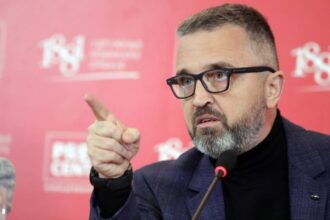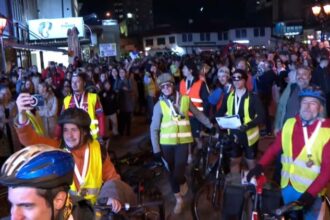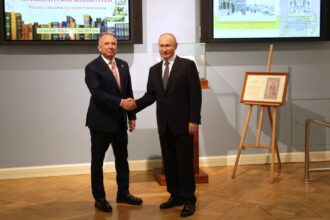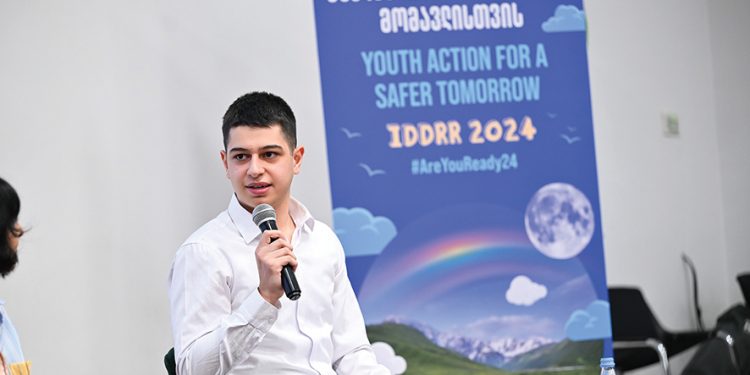Rezi Dgebuadze, Climate Ambassador, says that climate change is on the radar of many Georgian youths. However, there is always a chance to educate those who do not know about it.
Dgebuadze, an 18-year old Georgian, is involved in several initiatives to combat climate changes. During the event titled “Youth Action for a Safer Tomorrow,” held on October 3, by the United Nations Development Program and the Environmental Information and Education Center of Georgia’s Ministry of Environmental Protection and Agriculture. Young people from all over Georgia came together to discuss the initiatives they are involved in to push their nation toward a climate-focused future.
Discussions were held at the event, and a short documentary film, ‘Thank You For This World’, created by Rezi dgebuadze, and Karen Cirillo (the digital communications specialist of the UNDP Istanbul Regional hub), was screened. The documentary shows the hopes and fears that youth have about the future after climate change has further affected the world.
GEORGIA TODAY spoke with Dgebuadze to discuss his climate change initiatives, and the documentary he and Cirillo produced.
When did you first become aware of the problem of climate changes?
When I first heard of it, I was 15 years old. In school, they taught us a little bit about it, but not much. They didn’t stress how global the problem was or how big it was. I was introduced to non-formal learning, which played an important role in my understanding of the climate change issue. The Environmental Information and Education Center where I have worked for many years, has courses, projects and activities that introduced me to the basics of climate change and environmental protection.
What was your experience of the Youth Climate Ambassadors summer camp?
It was the first time I attended it in 2022. It’s a green camp held annually in collaboration with UNDP Georgia and Environmental Information and Education Center. Climate change is a real problem. The camp teaches students from all over the nation how to develop and launch a project. After ten days, the groups formed continue to advocate and raise awareness about climate changes. That’s an amazing thing. I can’t recall anything like this happening in Georgia.
The groups decide how long they want their project to last, but the majority choose one year. Most of the information that students learn at green camps is about climate changes, which they then pass on to other students at their high school. Most projects are aimed at raising awareness, advocating, and creating campaigns for eco-friendly products.
Tell us about the regional Network ‘Generation Nexus’.
It’s a network of youth in the region that includes Eastern Europe, Central Asia and the South Caucasus. There are only two coordinators in Georgia. The network is moderated through the UNDP Istanbul Regional hub, and our primary goal is to empower young people in this region. We have participated in regional conferences and undertaken projects such as photography to ensure that youth voices are heard. Generation Nexus is a group of youth activists who are focused not only on climate change but also on other issues such as human rights, energy, health care and others.
Why did you decide on making a documentary?
Video is the most effective tool to engage and attract people on social media. We thought of doing a documentary to integrate social media into our work at Generation Nexus. We didn’t want to do a classic documentary with information about climate changes, numbers, and other stuff that has been done a thousand times. I began to think about how to make a film with feelings and emotions. We wanted to show emotion and depict how youth view and engage with this global problem. Everyone knows that students in high school and university are not professionals, but they have a good understanding of the problem.
The film ends with hope. We were inspired by the poem “Thanks” written by American poet W.S. Merwin. The poem is pessimistic and sad about what mankind has done to our climate, but we chose the positive side.
What can youth do to empower themselves and help Georgia become more climate-focused, and how can they begin?
This was one of our goals with this short film. It’s great that so many youth are motivated and want to do something. But how can we get more involved in this good work. When working with youths, you should focus on emotions. If you don’t connect emotionally with them and don’t say something touching, then it’s hard to engage them. Then you can move on to raising awareness, educating them and teaching them the basics. I’m speaking from my own personal experience, as when I first heard about it, I was eager to learn more. It’s a chain reaction. You attend a course and want to attend others to learn as much as possible.
Georgia has a lot youth who are aware of this problem. It doesn’t really matter what they do or what they like to do, they all want to make a difference. It’s difficult to change your lifestyle. This is a problem that we often stumble across, but we are working to make things more green.
What are the ongoing projects in Georgia that youth are doing to engage communities on this topic?
“People may think that advocacy and raising awareness are the same, but each group has a different approach. One group’s project was very special: they integrated Roblox, the video game, into the engagement with youth. They turned climate-driven disasters like droughts, heavy rainfalls, etc. into a video game and made it available to the public. It’s an innovative way to use digital tools. My group and youth organisation made animations for campaigns including those against fireworks for the new years.
“Most of youth climate ambassadors and other volunteers of Environmental Information and Education Center have the right modules and tools, presentations and research from UNDP and Ministry of Environment and Agriculture for educating youth. They are ambassadors at their high schools and in their municipalities. This engagement continues to grow. It’s great to see so many youth organizations formed out of the green camps. There are so many in various municipalities and this good work is being carried out across the country.
Dgebuadze thanked Karen Cirillo for the “creative collaboration” that this short film provided to him and to the audience.
The ‘Youth Action for a Safer Tomorrow” was supported by the Green Climate Fund (GCF), the Swedish International Development Cooperation Agency Sida, and the Swiss Agency for Development and Cooperation SDC. The UNDP, with the support of the Green Climate Fund, the governments and agencies of Georgia, Sweden and Switzerland, has a climate programme in Georgia. This is a seven-year program aimed at implementing disaster management systems throughout the country.
By Shelbi R. Ankiewicz
Read More @ georgiatoday.ge













